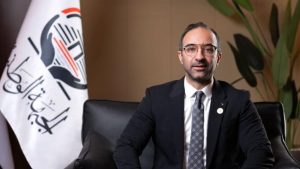Yesterday, Dr. Sultan bin Saif Al Neyadi, Minister of State for Youth Affairs, launched the “Young Financial Advisors Program,” organized by the Federal Youth Authority in cooperation with the Ministry of Finance, the Central Bank of the UAE, the Securities and Commodities Authority, and several leading national financial sector entities. The program includes 35 young men and women from various Emirates, within the economic axis derived from the main directions of the National Youth Agenda 2031 and as part of the UAE Youth Vocational School initiative.
Dr. Sultan bin Saif Al Neyadi stated that the “Young Financial Advisors Program” represents a new milestone in empowering youth in the UAE and embodies the wise leadership’s vision and deep belief that investing in youth energies is the cornerstone for building a more advanced and prosperous future, considering them the main drivers of the national economy’s future.
He explained that the program falls under the economic axis of the National Youth Agenda 2031 to be a qualitative platform preparing a promising generation of national competencies capable of actively contributing to sustainable economic development. Empowering youth in financial and knowledge fields is a national priority linked to the UAE’s vision for the next fifty years and reflects its leading position in shaping development models based on knowledge and innovation.
Khaled Al Nuaimi, Director of the Federal Youth Authority, said the program is a pivotal step toward preparing a qualified national elite to provide specialized financial consultations and spread financial awareness among youth, enhancing the UAE’s position as a global reference in financial consulting and economic innovation.
The program bridges the gap between academic study and practical experience, enabling participants to develop skills according to labor market requirements. It covers seven main areas: basics of financial culture, financial and monetary economy, entrepreneurial finance, financing and investment, financial regulations and systems, content creation, and training skills. The comprehensive in-person training curriculum combines theoretical education with practical application in a rich and intensive professional experience lasting four months, including more than 170 training hours distributed over more than 31 activities and programs, ranging from interactive workshops, field visits, an applied financial hackathon encouraging innovative thinking, to dialogue sessions with local and international experts.
Participants told Emarat Al Youm that the program is an important opportunity to raise awareness among various community groups, especially youth, about the importance of financial literacy amid the accelerating pace of today’s economy, contributing directly to improving living standards and achieving family stability.
Mohamed Al Majidi, Audit Manager at HSBC Bank and Vice President of the NAFIS Youth Council, said the lack of financial culture experience is one of the main challenges facing youth, leading to weak financial planning at the start of their careers.
He added, “The program aims to introduce youth to the importance of financial planning and financial culture in general, especially since many face difficulty managing their salary when receiving it for the first time, due to different environments, challenges, and personal priorities.” He confirmed that the UAE seeks to support youth in this regard because sound financial planning improves individuals’ quality of life, whether young or old.
He continued, “Our role in this program is to learn the basics of financial culture to become advisors to the community, especially youth, and contribute to spreading financial awareness and achieving a better quality of life for individuals.”
Challenges
Mahra Al Shamsi, an employee at First Abu Dhabi Bank, confirmed that one of the main challenges facing youth in financial management is the increasing consumer temptation, especially through social media, which promotes a luxurious lifestyle and creates social pressures leading youth to resort to personal and mortgage loans and credit cards, thus falling into financial crises.
She emphasized the importance of enhancing saving and investment skills among youth, especially in early school stages, noting that these skills are absent in many at this critical age.
Financial Culture
Khaled Al Khouri, Deputy Director of Risk Management at Al Waha Capital, called for enhancing financial awareness across the entire community, explaining that there is a significant gap between the current level of financial culture among youth and the required level.
He pointed out that the problem is not only the absence of financial planning but also the weak commitment to repaying loans and financial obligations, which requires doubling efforts to bridge this gap through continuous training and awareness programs.
He confirmed that participants in the “Young Financial Advisors Program” will start by developing their financial skills first, then move on to spreading financial culture concepts among community members, aiming to achieve financial and family stability that benefits society as a whole.
He addressed youth, saying, “Financial awareness is not an option but a personal responsibility amid current economic conditions. Every young person must strive to educate themselves and their families financially and take responsibility for their financial decisions, as the impact of these decisions affects not only themselves but also their family stability and social environment.”












Recommended for you
Talib Al-Rifai Chronicles Kuwaiti Art Heritage in "Doukhi.. Tasaseem Al-Saba"
Exhibition City Completes About 80% of Preparations for the Damascus International Fair Launch
Unified Admission Applications Start Tuesday with 640 Students to be Accepted in Medicine
Egypt Post: We Have Over 10 Million Customers in Savings Accounts and Offer Daily, Monthly, and Annual Returns
His Highness Sheikh Isa bin Salman bin Hamad Al Khalifa Receives the United States Ambassador to the Kingdom of Bahrain
Al-Jaghbeer: The Industrial Sector Leads Economic Growth